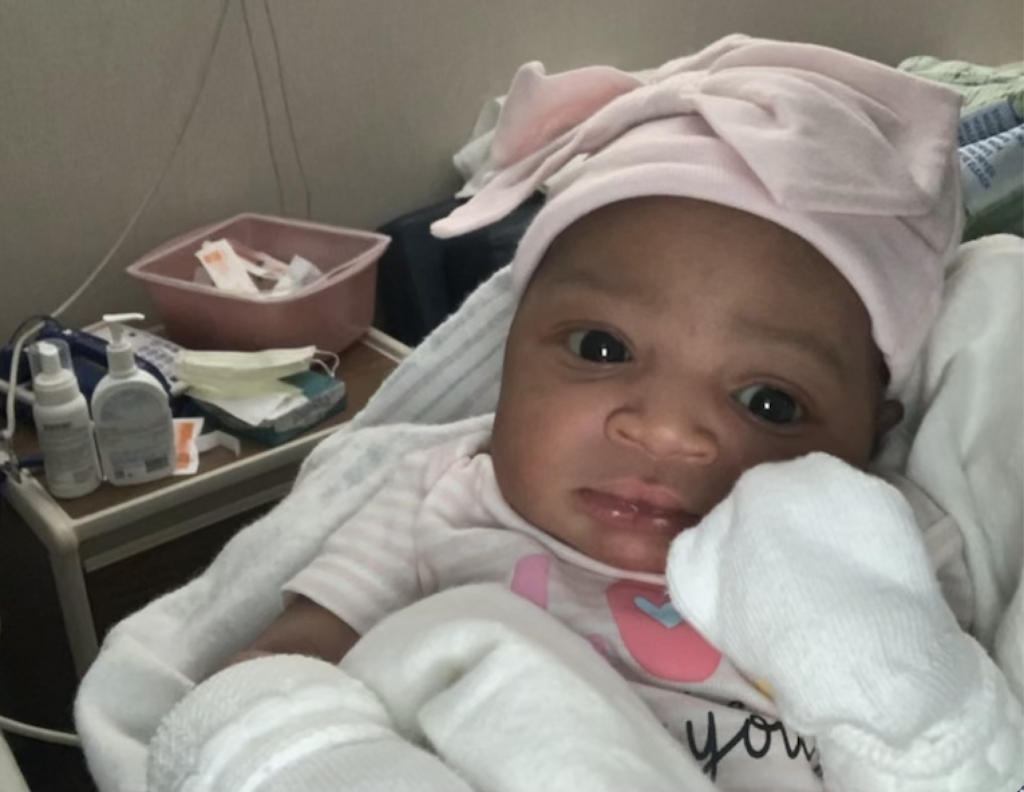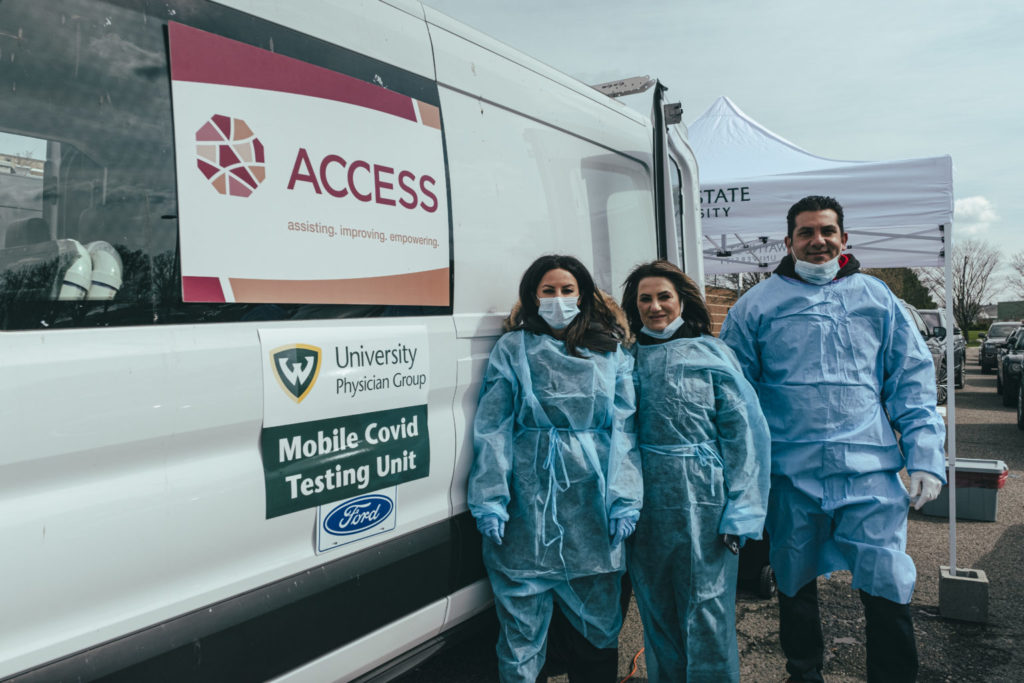‘A true partnership’: With United Way and BET support, ACCESS provides critical services to Black and immigrant communities
Published on January 28, 2021 in Crisis Relief
It’s not easy to manage a pregnancy during a global pandemic. There is constant worry over contracting the virus and the potential impact on a growing baby. There are doctor appointments and ultrasounds to attend without the comfort of loved ones. And, in many cases, this isolation extends into the delivery room.
For Detroit-native Olivia Young, there was an even more pressing concern facing her third trimester: the looming threat of homelessness. The thought of losing the apartment she would soon be sharing with her newborn daughter kept her awake at night and overshadowed nearly every happy moment.
Last fall, when Olivia lost her job as a dialysis assistant, she had already exhausted her savings and borrowed money from family members to keep the lights and gas on. She was out of options for rent.
A friend referred her to ACCESS (Arab Community Center for Economic and Social Services). The community service organization was able to pay four months of rent for the mom-to-be thanks to grant funding from BET in partnership with United Way Worldwide and United Way for Southeastern Michigan.
“I was so stressed out trying to figure out how I was going to keep from being evicted,” Olivia said. “ACCESS was such a blessing.”

When Olivia Young’s baby girl was born, the new mom could count safe housing as one less thing to worry about, thanks to ACCESS and United Way.

Facing a job loss and pregnancy during the pandemic, Olivia Young turned to ACCESS to help her stay in her apartment.
A series of unprecedented problems
United Way for Southeastern Michigan understands that a family’s basic needs must be met to create stable households where children can thrive. For the 44 percent of families in our region that were already struggling to make ends meet, the pandemic added an additional barrier to long-term stability.
And in Detroit, a city where the population is nearly 80 percent Black, 74 percent of households struggle to stay financially stable due to a myriad of reasons, including lack of access to jobs and training, quality education and child care, health care and transportation.
To help Olivia and other families overcome emergency needs and build toward lasting self-sufficiency, United Way for Southeastern Michigan awarded nine organizations, including ACCESS, a total of $3.3 million in funding in 2020, supported by the Saving Our Selves: A BET COVID-19 Relief Effort fundraiser and subsequent donations.
The BET grants are just one of the ways United Way stepped up in the past year to help community organizations and the families they serve meet the increased need as a result of the pandemic and resulting impacts on health, the economy, education and child care. Since March 2020, United Way has distributed more than 1,000 grants totaling more than $35 million in funds — from churches and block clubs exploring innovative ways to help their neighbors to some of the largest providers of food and shelter in our region that needed help to close gaps in funding and meet increased demand.
The BET grants targeted the city of Detroit and other cities where the African American population has been disproportionately impacted by COVID-19.
In the early weeks of the pandemic, African Americans accounted for nearly 43 percent of COVID-19 deaths in Michigan while representing just 13.7 percent of the population. The share has decreased over time in Metro Detroit, but the initial variances in these hotspots highlighted the need to address stark disparities in minority health care, education, employment and more.
“The pandemic forced us to take a deeper look and examine what we can do better to advance racial equity overall and specifically in health care,” said Megan Thibos Director, Economic Mobility Initiatives at United Way for Southeastern Michigan. “We have to address the systemic inequities in health and health care that have made African Americans more vulnerable in the COVID-19 crisis. Addressing the root causes of preexisting conditions like diabetes, heart disease, and high blood pressure, is critical to achieving better outcomes and making the community more resilient to future threats.”
Deepening the divide
Pandemic-related job losses have fallen heaviest on the service sector where African Americans and other people of color are overrepresented, and few can depend on the relative safety of working from home.
Batoul, a single mother of three, was laid-off from her grocery store job at the beginning of the pandemic. By the time she was called back to work, her children were dependent on virtual learning. Three months behind on rent, she reached out to ACCESS for help. Their team was able to pay her back rent and is working to help her find employment that will allow her to stay home with her children throughout the day.
Since May 2020, ACCESS helped 369 families like Olivia and Batoul with rent and mortgage payments or other utility costs.
“COVID-19 has had a major impact on the communities we serve as well as our own operations, funding, and work,” said Anisa Sahoubah, Youth and Education Director at ACCESS who also leads the organization’s integration strategy. “Coronavirus is having the most devastating effects on vulnerable populations that were already isolated due to poverty, lack of transportation, and other economic and social factors. The situation has been exacerbated as people lose jobs and wages, leaving them exposed to the most extreme consequences of the pandemic.”

Thanks in part to grant funding from United Way, ACCESS began mobile COVID-19 testing on March 20. Photo courtesy of ACCESS.
A mission to help
When these vulnerable populations needed help with everything from filing for unemployment benefits to finding their next meal, they turned to ACCESS — a trusted community resource that could help them safely navigate uncharted territory.
While ACCESS was founded nearly 50 years ago to help the area’s Arab immigrant population adapt to life in the United States, the organization has since grown to include 11 locations and 120 programs that offer social, economic, health and education services to a diverse population.
During a typical year, the agency serves 70,000 individuals. But 2020 was anything but typical.
Requests for social service and emergency service programs skyrocketed 242 percent, while food assistance inquiries increased 272 percent over the previous fiscal year. More than 2,250 households (11,250 individuals) received assistance with essential items such cleaning and hygiene supplies, personal protective equipment, clothing, furniture, household appliances, and more — a year-over-year increase of 592 percent.
“I can’t begin to describe the impact of the BET funding and the relationship with United Way,” Anisa said. “People were truly struggling — many still are — but the funding allowed us to make a tremendous positive impact.”
Rising to the occasion
Anisa said that after 50 years of service, ACCESS had developed contingency plans for nearly every scenario. COVID-19 would prove to be the exception.
“Within a matter of days, everything changed,” she said. “We had to revamp our entire operation, shifting more than 500 employees from working in our office and meeting clients face–to–face to working entirely remotely.”
When the shift to virtual interactions proved difficult for some clients, ACCESS rose to the challenge, providing nearly 900 households with tablets or computers and helping even more receive free or reduced-price internet access. The staff also taught hundreds of people basic computer skills like sending email, document submission, and how to participate in online classes.
With things evolving so quickly, ACCESS crowdsourced information and best practices on weekly calls with a cohort of other nonprofits.
“It was important for us to remain flexible and embrace new ideas early on,” Anisa said.
One such idea was to use WhatsApp — a messaging platform that is frequently used by immigrants — to connect with individuals and share content.
“People needed accurate information to separate fact from fiction about the virus, executive orders and steps to prevent the spread,” Anisa said.
With the support of a collaborative grant from United Way, ACCESS became one of the earliest COVID-19 drive-through testing sites, partnering with Wayne State University Physician Group to provide testing for frontline workers. Testing soon expanded to the general population with United Way donating N95 masks to ensure everyone’s safety.
The agency also partnered with Ford motor Company to implement a “drive-to” testing initiative, which allowed them to expand their reach into more remote locations.
To date, more than 17,200 individuals have been tested through these initiatives.
A true partnership
As the pandemic continued to exploit systemic inequities, BET released additional resources to target community health.
“When United Way received additional funding as a part of BET’s ongoing COVID-19 relief efforts, we looked closely at the organizations that were most effectively completing their goals and having the largest impact,” Megan said. “On that basis, we decided to give more to ACCESS.”
ACCESS is using the grant expansion to purchase a Mobile Health Unit that will be outfitted to provide onsite care to residents in impoverished areas — an idea that was created following the success of their drive-up and drive-to testing sites. This investment will enable ACCESS to more effectively deliver preventive care to communities most at risk from untreated chronic health problems.
As a funded partner for several decades, Anisa expressed gratitude that the relationship between United Way and ACCESS is “not a one-sided grantor, grantee relationship. It’s a true partnership that makes both organizations stronger.”
To learn more about how United Way for Southeastern Michigan is helping our region recover from the impact of the COVID-19 pandemic, click here.